PITO: Difference between revisions
No edit summary |
m removed Category:Companies using HotCat |
||
| (2 intermediate revisions by 2 users not shown) | |||
| Line 25: | Line 25: | ||
}} | }} | ||
'''PITO''' was a Non-Departmental Public Body | '''PITO''' was a Non-Departmental Public Body supporting the UK police and other criminal justice organizations in reducing crime and in administering justice more effectively by providing information and communication technology solutions, either directly or through contracts with suppliers. PITO helps the police service get the best value for the goods and services they buy by setting up collective procurement arrangements.<ref>[http://www.networkcritical.com/Case-Studies/Police-Information-Technology-Organisation-%28PITO%29 networkcritical.com]</ref> | ||
PITO receives a grant-in-aid from the Home Office, | PITO receives a grant-in-aid from the Home Office, Police, Probation, Immigration, and other | ||
services. It also earns money by charging for | services. It also earns money by charging for its services. | ||
Some of the prominent projects of PITO include IDENT1 and NAFIS. NAFIS was replaced by IDENT1 and they were the national fingerprint database. | Some of the prominent projects of PITO include IDENT1 and NAFIS. NAFIS was replaced by IDENT1 and they were the national fingerprint database. | ||
==History== | ==History== | ||
PITO was formed in 1996 and it became a Non-Departmental Public Body | PITO was formed in 1996 and it became a Non-Departmental Public Body in 1997.<ref>[http://dircweb.king.ac.uk/vitab/documents/police_science_and_technology_strategy_2003-2008.pdf dircweb.king.ac.uk]</ref> | ||
PITO recieved the ISO 9001 certification in 2006 for it's business practices and procedures.<ref>[http://www.publictechnology.net/content/5251 publictechnology.net]</ref> | PITO recieved the ISO 9001 certification in 2006 for it's business practices and procedures.<ref>[http://www.publictechnology.net/content/5251 publictechnology.net]</ref> | ||
In April 2007, PITO was replaced by the National Policing Improvement Agency.<ref>[http://www.nuffieldbioethics.org/sites/default/files/The%20forensic%20use%20of%20bioinformation%20-%20ethical%20issues.pdf nuffieldbioethics.org]</ref> | In April 2007, PITO was replaced by the National Policing Improvement Agency.<ref>[http://www.nuffieldbioethics.org/sites/default/files/The%20forensic%20use%20of%20bioinformation%20-%20ethical%20issues.pdf nuffieldbioethics.org]</ref> | ||
== References == | == References == | ||
| Line 58: | Line 45: | ||
* [http://www.npia.police.uk Official website of NPIA] | * [http://www.npia.police.uk Official website of NPIA] | ||
[[Category: | [[Category:Government Agencies]] | ||
__NOTOC__ | __NOTOC__ | ||
Latest revision as of 15:19, 17 March 2021
 | |
| Type: | Government |
| Industry: | Internet |
| Founded: | UK, 1996 |
| Headquarters: | Fry Building, 2 Marsham Street, London, SW1P 4DF |
| Country: | UK |
| Email: | enquiries [at] npia.pnn.police.uk |
| Website: | npia.police.uk |
| Key People | |
| Temporary Chief Constable Nick Gargan, Chief Executive Paul Minton, Chief Operating Officer | |
PITO was a Non-Departmental Public Body supporting the UK police and other criminal justice organizations in reducing crime and in administering justice more effectively by providing information and communication technology solutions, either directly or through contracts with suppliers. PITO helps the police service get the best value for the goods and services they buy by setting up collective procurement arrangements.[1]
PITO receives a grant-in-aid from the Home Office, Police, Probation, Immigration, and other services. It also earns money by charging for its services.
Some of the prominent projects of PITO include IDENT1 and NAFIS. NAFIS was replaced by IDENT1 and they were the national fingerprint database.
History[edit | edit source]
PITO was formed in 1996 and it became a Non-Departmental Public Body in 1997.[2]
PITO recieved the ISO 9001 certification in 2006 for it's business practices and procedures.[3]
In April 2007, PITO was replaced by the National Policing Improvement Agency.[4]
